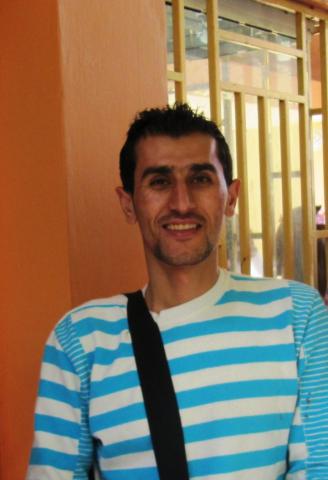
On 8 September 2015, Alkarama and Human Rights Guardians sent a communication to the United Nations Working Group on Enforced or Involuntary Disappearances (WGEID) regarding the disappearance of Anas Al Husseini, a Syrian Kurd arrested by the security forces in December 2012, tortured and forced to confess on television, after which he was transferred to an unknown detention centre.
A 32-year-old worker at a cleaning company in Damascus, Al Husseini was arrested on 13 December 2012 by security forces from the 40th Branch of the "State Security", known as the "Anti-Terrorism" Branch. The same day, Al Husseini's cousin, Abdul Raouf – known as "Joan" – was arrested in the city of Jaramana, 10 km southeast of Damascus, by the same forces. Handcuffed and forced into a car, Joan found his cousin showing clear signs of the heavy beating he had just been subjected to. The men were taken to the 40th Branch in Damascus before being transferred to the "Al Khateeb Branch", also known as the "Interior Branch" or "Branch 251". Both branches are under the control of the General Intelligence Directorate, which is responsible for the internal surveillance of the population, and is sadly infamous for torturing detainees held in the premises of the different branches under its control.
Following their respective abductions, Al Husseini and Joan were kept in a cell with two other men for about a month and a half before being taken to an investigation room, where the officer in charge of their cases told them that their "confessions" were going to be recorded for a television broadcast. Al Husseini was forced to confess under torture to planning to assassinate Bashar Al Assad as well as the Minister for Foreign Affairs, Walid Muallem, as he and his co-workers allegedly had access to the Presidential Palaces through the cleaning company they worked for. Al Husseini's confession under torture was broadcasted on television on 3 March 2013.
Since he still bore visible marks of torture on his face, Joan was not forced to confess on television. Released a few months later, he told Al Husseini's relatives that he had not seen his cousin after he had been forced to confess. Following his arrest, Al Husseini's parents went to Damascus to search for him and even appointed lawyers to help them find him, but to no avail. They were informally told by former detainees that their son was detained in the State Security Branch located in the Kafr Sousa neighbourhood of Damascus.
Left with no other resort at the national level, Al Husseini's family contacted Human Rights Guardians and Alkarama in the hope that they could help shed light on their relative's fate and whereabouts. In view of the information presented above, the organisations seized the WGEID asking this special procedure of the UN Human Rights Council (HRC) to call upon the Syrian authorities to release him immediately or, at the very least, to put him under the protection of the law by disclosing his whereabouts and allowing his family to visit him without restriction.
"In Syria, torture is mostly practiced with the aim of extracting confessions that will later be used to convict the victims before special courts without any other material evidence," says Inès Osman, Legal Officer for the Mashreq at Alkarama, urging the State to put an end to the systematic violation of human rights, "in particular to the use of enforced disappearances and torture", and to combat impunity for their perpetrators.
For more information or an interview, please contact the media team at media@alkarama.org (Dir: +41 22 734 1008).
